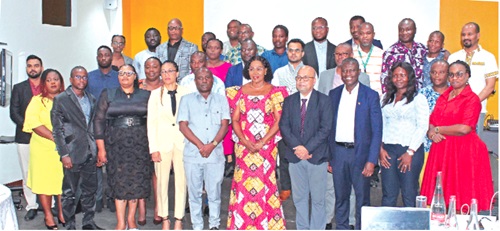
EPA advocates level playing field in solid waste management system
The Executive Director of the Environment Protection Agency (EPA), Dr Henry Kwabena Kokofu, has advocated a level playing field for private players in the solid waste management (SWM) ecosystem to ensure the sector is turned into viable business model.
Through that, he said country could easily achieve its aspiration of having a sustainable solid waste management system.
In addition, he said waste management must have an inclusive approach by putting the citizenry at the epicentre to promote shared responsibility with engineered behaviour change strategies, policies and services.
He was speaking at the opening of the fourth Global Forum of Cities for Circular Economy (GFCCE) workshop which took place in Accra on November 21.
The event, a collaboration with the EPA, provided a platform to all the GFCCE member nations to share their knowledge, practices and evidence-based learnings to contribute to circular economy in solid waste management.
GFCCE is currently a community of 19 member countries from the global south with a common agenda to improve their solid waste management ecosystem.
SWM
Dr Kokofu noted that SWM was one of the key responsibilities of city administrators and one of the effective indicators of good governance.
He indicated that effective SWM would help to mitigate adverse health and environmental impacts and improve the resilience of cities.
However, he said unsustainable SWM practices, exacerbated by rapid urbanisation including human mobility, both planned and unplanned, financial and institutional limitations, brought about severe impacts on public health and environmental sustainability.
That, he said undermined the achievement of the sustainable development goals particularly goal number 11.
Like most African countries, Dr Kokofu said, Ghana was witnessing an increasing waste management crisis that had the potential to degenerate into environmental degradation.
EPA programmes
Over the years, the EPA boss said, his organisation had initiated several programme such as source waste segregation and take-back systems to help promote sustainable waste management models in the country.
In addition, he said the agency had developed several guidelines, standards and legislative instruments to enforce its regulations on sustainable waste management.
In spite of all the efforts, Dr Kokofu said the country was still faced with key barriers and challenges like most developing countries.
Those barriers and challenges, he said, had aggravated environmental and public health risks, particularly in low income, densely populated and flood-prone urban areas.
“To this end, the EPA believes that SWM must be driven based on the principle of circular economy.
The aspiration of having a sustainable solid waste management ecosystem must encompass strong policies and stringent enforcement regime, while creating a level playing field for private players to turn the services into viable business models such as recycling, reuse and resources recovery of waste materials,” Dr Kokofu stated.
AMA interventions
The Chief Executive of the Accra Metropolitan Assembly, Elizabeth Naa Kwatsoe Tawiah Sackey, said her office had an ambitious target of reducing greenhouse gas emissions by 76 per cent below business-as-usual levels by 2050.
She said there were five priority waste sector actions outlined in Accra’s Climate Action Plan (CAP) for the period 2020 to 2025.
The aim of the priority action, she said, was to attain universal solid waste collection coverage, divert waste from landfill and safe disposal of residual waste.
Mrs Sackey said the AMA was currently implementing initiatives such as Municipal Solid Waste Source Separation Programme, Citywide Source Separation Programme, Community Compost Programme among others.
